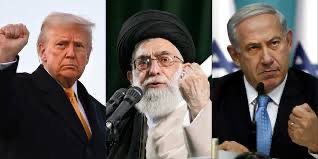By: Ovieomeleh
In a dramatic escalation of Middle East tensions, the United States launched coordinated air and missile strikes on three of Iran’s most sensitive nuclear facilities early Saturday morning, marking a historic moment of confrontation with profound global implications.
The attacks, confirmed by both American and Iranian sources, targeted the Fordow, Natanz, and Isfahan nuclear sites.
The airstrikes come amidst weeks of intensifying conflict across the region, particularly involving Israel and Iranian proxy forces.
But this latest military action signals a direct and unambiguous U.S. engagement in the broader conflict potentially triggering far-reaching consequences.
Trump Breaks the News: “A Spectacular Military Success”
The U.S. President Donald Trump, who returned to office in January 2025, announced the strike on X Social, platform shortly after it occurred.
“We have COMPLETELY and TOTALLY obliterated Iran’s nuclear enrichment capability at Fordow. A HISTORIC military operation.
A full payload of BOMBS was delivered. Peace through strength!” he posted.
The post triggered a surge in traffic that temporarily crashed the site. In a follow-up message, Trump issued a stern warning:
“ANY RETALIATION BY IRAN AGAINST THE UNITED STATES OF AMERICA WILL BE MET WITH FORCE FAR GREATER THAN WHAT WAS WITNESSED TONIGHT.”
Iran Reacts: “Diplomacy is Over”
Iranian officials swiftly condemned the strikes as a blatant act of aggression.
Speaking from Istanbul, Iran’s Foreign Minister Abbas Araghchi declared that the United States had “crossed a very big red line,” warning that the Islamic Republic now reserved “all options” in its response.
“This reckless attack is a gross violation of the UN Charter and international law,” Araghchi said. “Diplomacy is over. The Islamic Republic of Iran will defend its sovereignty by any means necessary.”
Iran’s parliament also issued a unified statement, calling the attack a “crime against humanity,” while the Islamic Revolutionary Guard Corps (IRGC) threatened a response “beyond the understanding and calculations of the aggressor.”
Though Iranian state media confirmed that the Fordow nuclear facility was struck, officials attempted to downplay the damage. A member of parliament from Qom insisted that the site had “not been seriously damaged.”
The Retaliation: Missiles Rain Down
Iran wasted no time in mounting a response. According to multiple regional reports, Iran launched 40 surface-to-surface missiles targeting military and civilian sites in Israel overnight. The extent of the damage and casualties is still emerging, but air raid sirens reportedly rang out across Jerusalem and Tel Aviv, with several interceptions by Israel’s Iron Dome defense system.
As of now, there have been no confirmed Iranian strikes directly against U.S. military installations, though analysts warn that such action may still be in the pipeline.
World on Edge: International Reactions Pour In
The global response has been swift and cautious.
• UN Secretary-General António Guterres issued an urgent appeal for restraint, warning that a wider war “would be catastrophic for the region and the world.”
• UK Prime Minister Keir Starmer expressed concern over the escalation, saying the UK supported nuclear non-proliferation but urged all parties to “pull back from the brink.”
• Russia and China strongly condemned the U.S. action, accusing Washington of acting unilaterally and destabilizing an already volatile region.
• Turkey, Pakistan, and Iraq also denounced the strikes, calling for an immediate ceasefire and the resumption of diplomacy.
A Line Crossed or a Strategic Strike?
While U.S. officials frame the attack as a necessary step to eliminate a nuclear threat, critics argue it may spark a long and bloody conflict in the Middle East. International Atomic Energy Agency (IAEA) reports indicate no radiation leaks so far, but they have not confirmed the full extent of the damage.
Political analysts suggest that this moment could redefine international relations in the region. With Israel already engaged in a complex war with Hezbollah and Hamas, and Iran now directly targeted by the United States, the prospect of a wider regional war looms large.
What Next?
All eyes are now on Tehran and Washington. Will Iran escalate further? Will U.S. allies rally behind the strikes, or call for immediate de-escalation?
And what of the Israeli front, where tension continues to simmer?
For now, one thing is clear: the fragile balance of power in the Middle East has been dramatically upended.





.jpg)









0 Comments